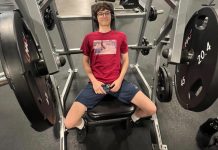By Maddie Baker

Going back to school can be a shock to the system with all the big words and long equations after three months of sitting poolside. Any ambition to prepare for the next school year was drowned out in endless episodes of Netflix over summer vacation. Never again should students have to return from a long summer spent losing all the knowledge gained the previous school year with this easy guide to staying sharp.
“I do not normally review school work over the summer unless necessary, but it would prepare me for the studies I will face,” Josh Bombala, junior, said.
Reading is possibly the best way to keep the mind active over the summer. It expands vocabulary, improves comprehension, and keeps the brain from going zombie-like. English teachers assign summer reading, so that as soon as class resumes, it is easier to get into the flow of things again. It doesn’t matter what genre a student chooses because the more the student is interested, the more information is absorbed.
One way to retain more information is to use flashcards. Flashcards are easy to come by, whether store-bought, off the Internet, or homemade. They give the brain a hint to remember facts from a while ago. Flashcards are also convenient because it’s easy to self-test, and they also assist those who learn better with visuals. They force people to evaluate how well they actually know the material when it is placed in front of them. They are useful because students can separate flashcards into piles like what they struggle with and what they are confident about.
“I like to make my own flashcards, and then have people quiz me,” Matthew Sims, sophomore, said.
Another useful tool to exercise old knowledge is a practice workbook. Most teachers have spare workbooks, or students can buy them at Barnes & Noble and other similar stores. Old textbooks and study guides are also found at thrift shops. For those special few who don’t burn their old assignments at the end of the year, reviewing old notes is a great way to keep the previous year’s knowledge fresh in the mind.
“My favorite way to study is to write a single page of key information for the unit and study that, rather than all of the notes. This helps me focus on the important information, rather than overwhelming myself with details that are not as important,” Hana Sasaki, freshman, said.
Students may use websites to preserve skills that can be forgotten over the long break. Websites often recommended by teachers include khanacademy.com, conjuguemos.com, and bjpinchbeck.com. There are also websites that have more brain teasers than traditional lessons like luminosity.com, brainbashers.com, and pzzls.com.
For those who don’t feel motivated to study alone, a group of friends can be very helpful in remembering the previous year’s material. Studying with friends can raise motivation and make learning fun rather than a dreaded activity. In fact, group study allows more information to be passed around because each individual will remember things that others may have forgotten.
“I prefer to study with a group because I tend to focus more since I feel dedicated to staying on track when I’m with my group,” Maureen Dunn, senior, said.
Summer means vacation, but vacation doesn’t mean loss of brain cells. Students can find a method that works for them, so when the fateful time for another first day of school rolls around, they are ready for it.











